In this latest report for the Oxford University Europe's Stories research project we follow up on the findings from our December 2020 survey about the crucial importance of freedom of movement. We then assess how European citizens think of the European Union (EU) today, and what they want from it in the future. Our March 2021 poll, conducted in the 27 member states of the EU and the UK, provides mixed reading for the EU.
Respondents generally support greater integration of the Union and are in favour of the EU taking action on issues like employment and economic redistribution. But there is also clear dissatisfaction with the EU's distribution of Covid-19 vaccines and a plurality of respondents agree that freedom of movement has brought more costs than benefits for their country. Seven out of ten of those we surveyed identify as "European" and there is more support for greater EU integration than for less EU integration. There is also support for the EU upholding democratic rights in member states, maintaining a hard external border, acting further to protect jobs from the threat of automation and redistributing wealth from richer EU countries to poorer ones.
However, we find that 44% of Europeans report not having benefited from freedom of movement personally, and there are more Europeans who believe that freedom of movement has brought more costs than benefits for their country than vice versa. We also find that Europeans are largely critical of the European Commission's handling of the distribution of Covid-19 vaccines, with 45% believing this has been handled badly.
Our findings suggest that young Europeans are more optimistic than older generations about the European project. Under-30s are found to be more supportive of European integration, more likely to support greater EU intervention on issues currently reserved for national governments, and more likely to report having personally benefited from freedom of movement.
Freedom of movement
In our last report we found strong support for freedom of movement and free travel, with 74% saying that the EU would not be worth having without the freedom to travel, work, study and live in other EU member states. Following this striking finding, we decided to ask more detailed questions about the potential costs and trade-offs of freedom of movement, and the consequences of internal free movement for the external border of the European Union.
To avoid difficulties with the definition of freedom of movement, we prompted all respondents with the following statement: "Now we would like to ask you some questions about freedom of movement inside the European Union. Freedom of movement is the right of all EU citizens to study, work and live in other member states of the European Union."
Do the costs of freedom of movement outweigh the benefits?
First we asked respondents how much they agreed or disagreed with the statement, "freedom of movement has had more costs than benefits for my country". In total, 37% agreed with this statement, while only 32% disagreed (figure 1). This suggests that, despite our previous findings of strong support for freedom of movement, the mood in Europe is in fact more mixed with regards to whether free movement has been entirely a good thing at the country level.
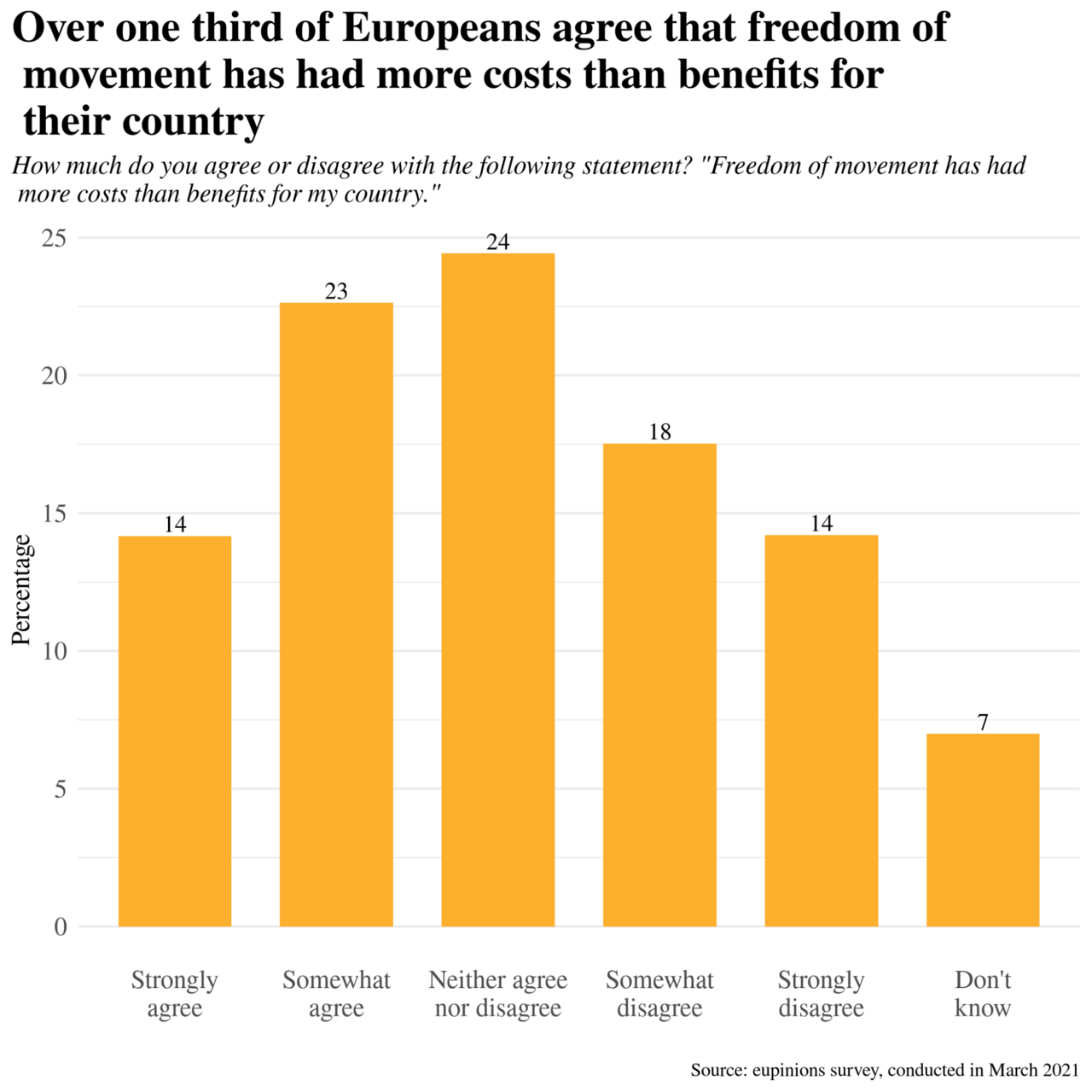
Figure 1
Of those countries with a large enough sample for us to analyse their responses to the question, respondents from France were most likely to agree with the statement, while respondents from Poland were the most likely to disagree that free movement has brought more costs than benefits for their country - perhaps not a surprising finding given so many Poles have benefitted from free movement (figure 2).
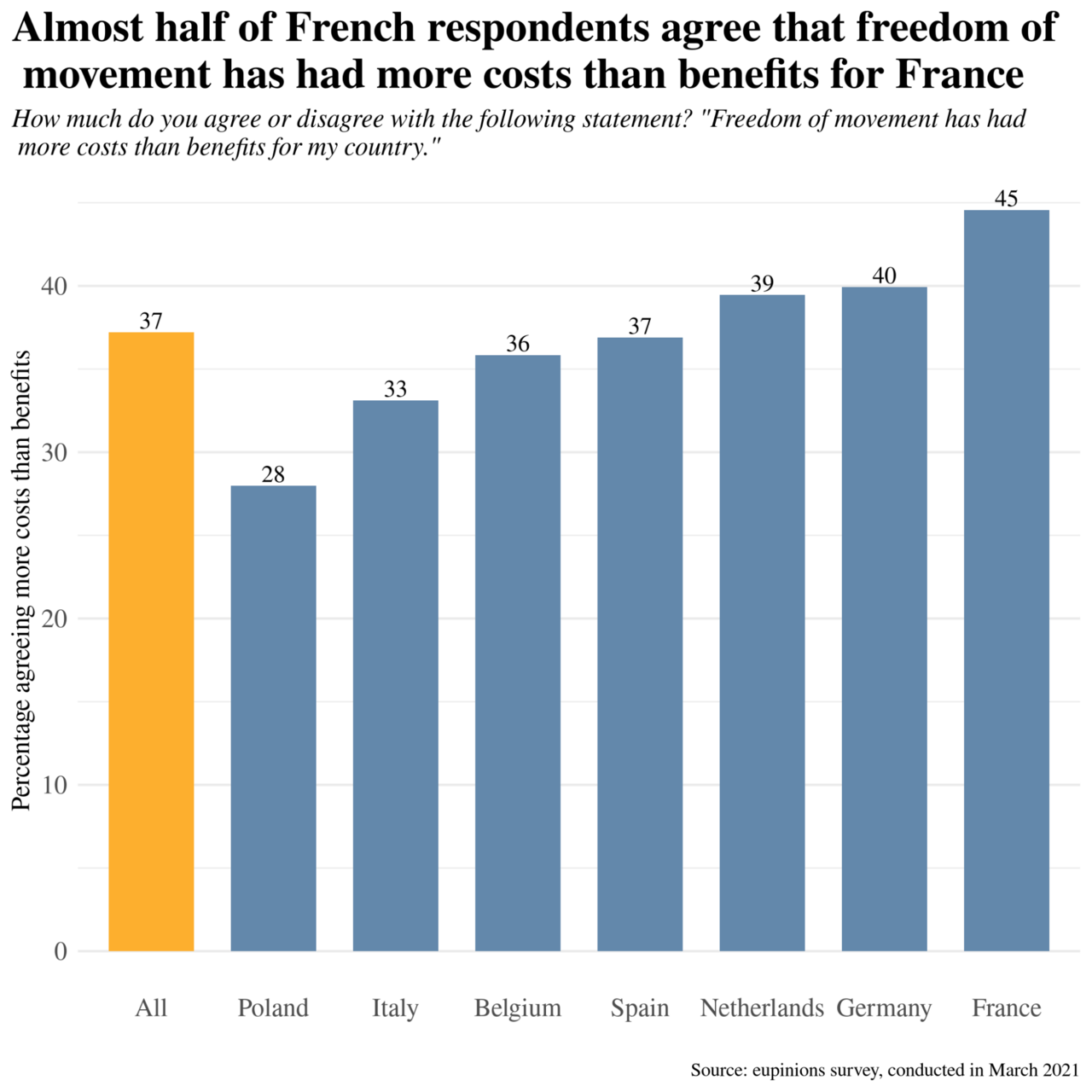
Figure 2
This question revealed no major difference between generations, but there were differences by education; the higher the educational attainment of our respondents the less likely they were to think that freedom of movement has brought more costs than benefits for their country.
Freedom of movement - personal benefits
We next asked respondents about their personal relationship with freedom of movement, asking which element of free movement they had benefited from the most. Of our respondents, 44% reported that they had not benefited at all from freedom of movement (figure 3). Of the benefits available to select, making friends from other EU countries was the most chosen response, with 16% of respondents selecting this as the main benefit of freedom of movement, followed by previously living in another EU country (12%) and some other benefit (10%).
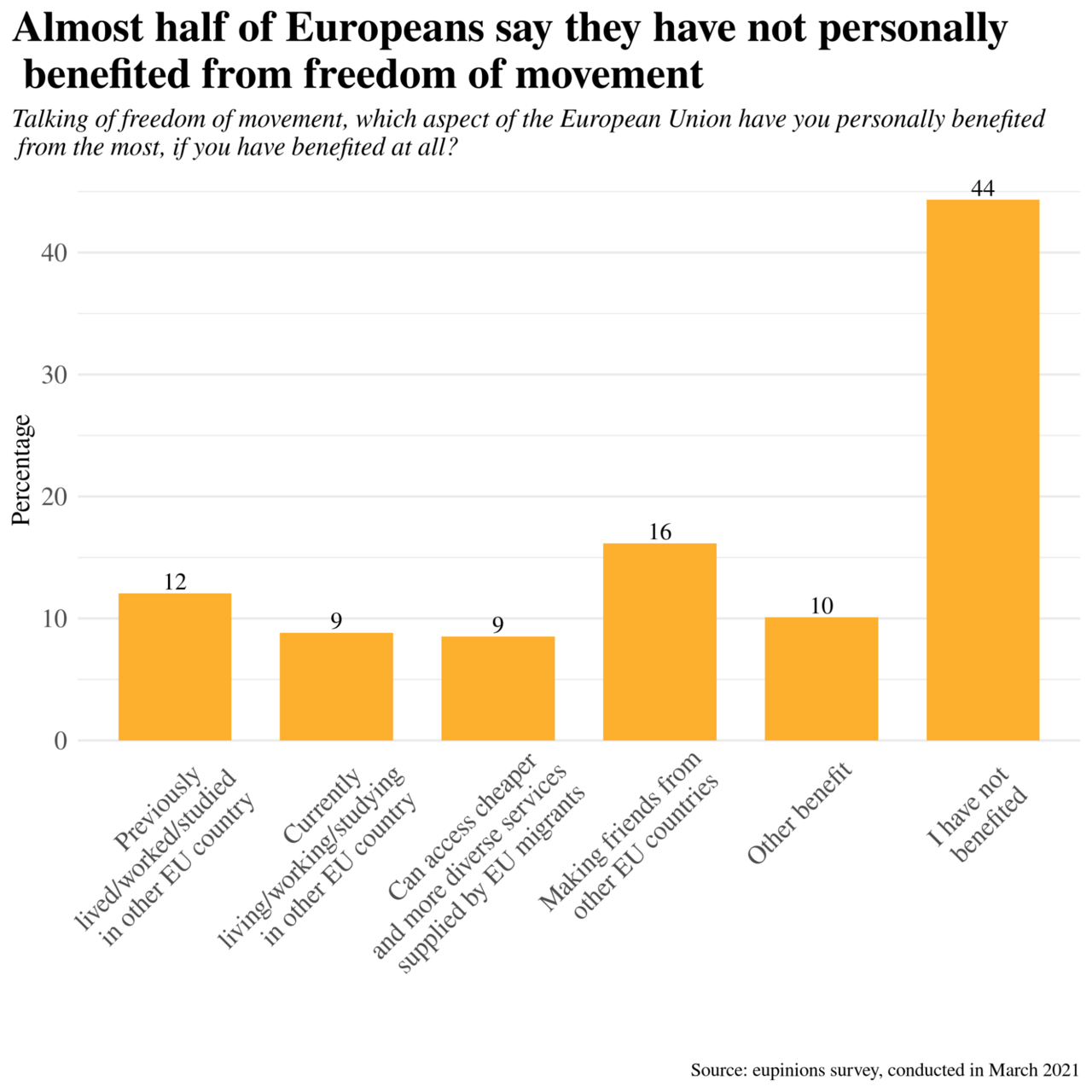
Figure 3
There were, however, big differences in the age breakdown of responses to this question. Only a quarter of respondents under the age of 30 reported that they had not benefited at all from freedom of movement, compared to nearly three fifths of over-50s saying they had not benefited (figure 4). Young Europeans were also more likely to report benefiting in one of the ways listed than any other age group, with nearly a third currently or previously having lived, worked or studied in another EU country.
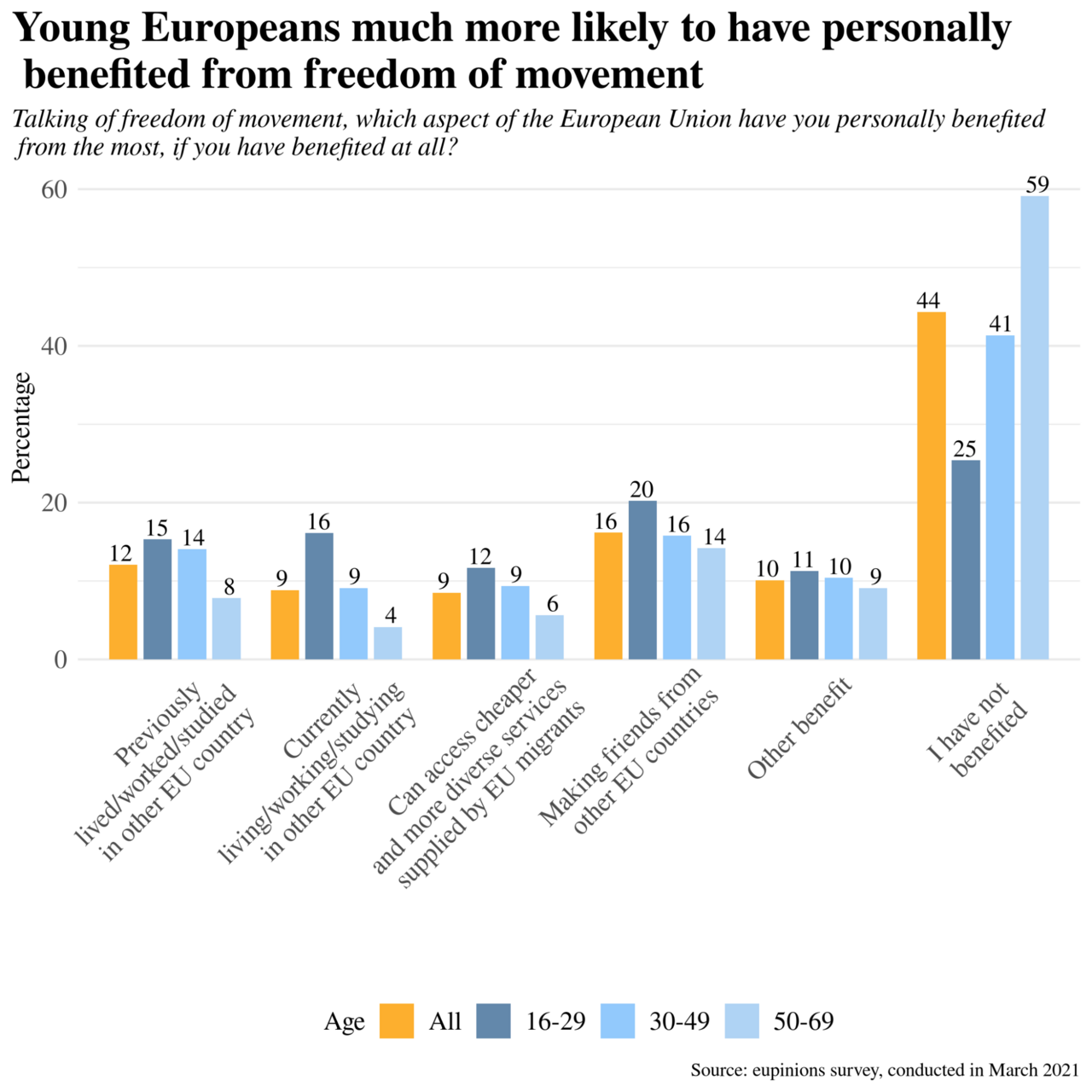
Figure 4
Graduates were also more likely to report that they had benefited from free movement personally. In line with our results to the previous question, respondents from France were most likely to report that they had not personally benefited from freedom of movement, while those from Poland were least likely to list no benefits of free movement.
A well-guarded EU border - a necessary cost?
To further explore how Europeans think about the costs and benefits of freedom of movement within the EU, we asked how much they agreed or disagreed with the statement, "To ensure freedom of movement inside the European Union, the EU must have a well-guarded external border". There was strong agreement with this statement, with 65% of respondents agreeing or strongly agreeing with the statement (figure 5). There were, however, sharp divides in answers to this question by age, with the youngest respondents being much less likely to strongly agree that a well-guarded external border is necessary for the EU.
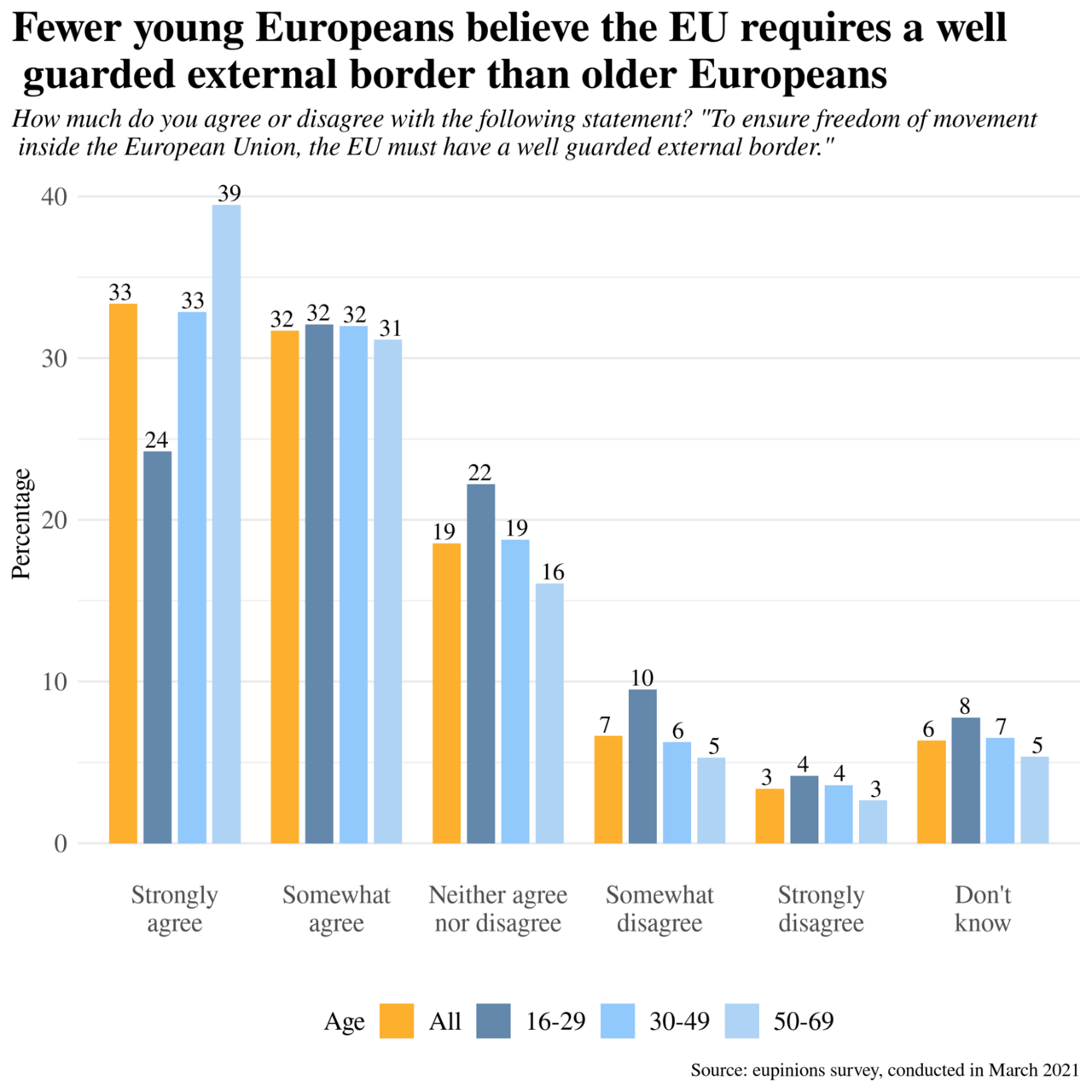
Figure 5
There were also differences between the countries we sampled, with Spanish respondents most likely to strongly agree with the statement and Germans slightly more likely to disagree. Overall, men were slightly more likely to strongly agree that the EU must have a well-guarded external border than women.
The role of border guards
We also asked about the future of freedom of movement, in the form of asking respondents what the priorities of the EU's soon to be recruited 10,000 external border guards should be. The most popular response to this was fighting cross border crime and terrorism, closely followed by preventing unlawful entry to the EU (figure 6). Again, there were sharp divides in priorities between different age groups in response to this question, with the under-30s being less concerned about preventing unlawful entry to the EU and more concerned about ensuring the safety of those attempting to enter the EU.
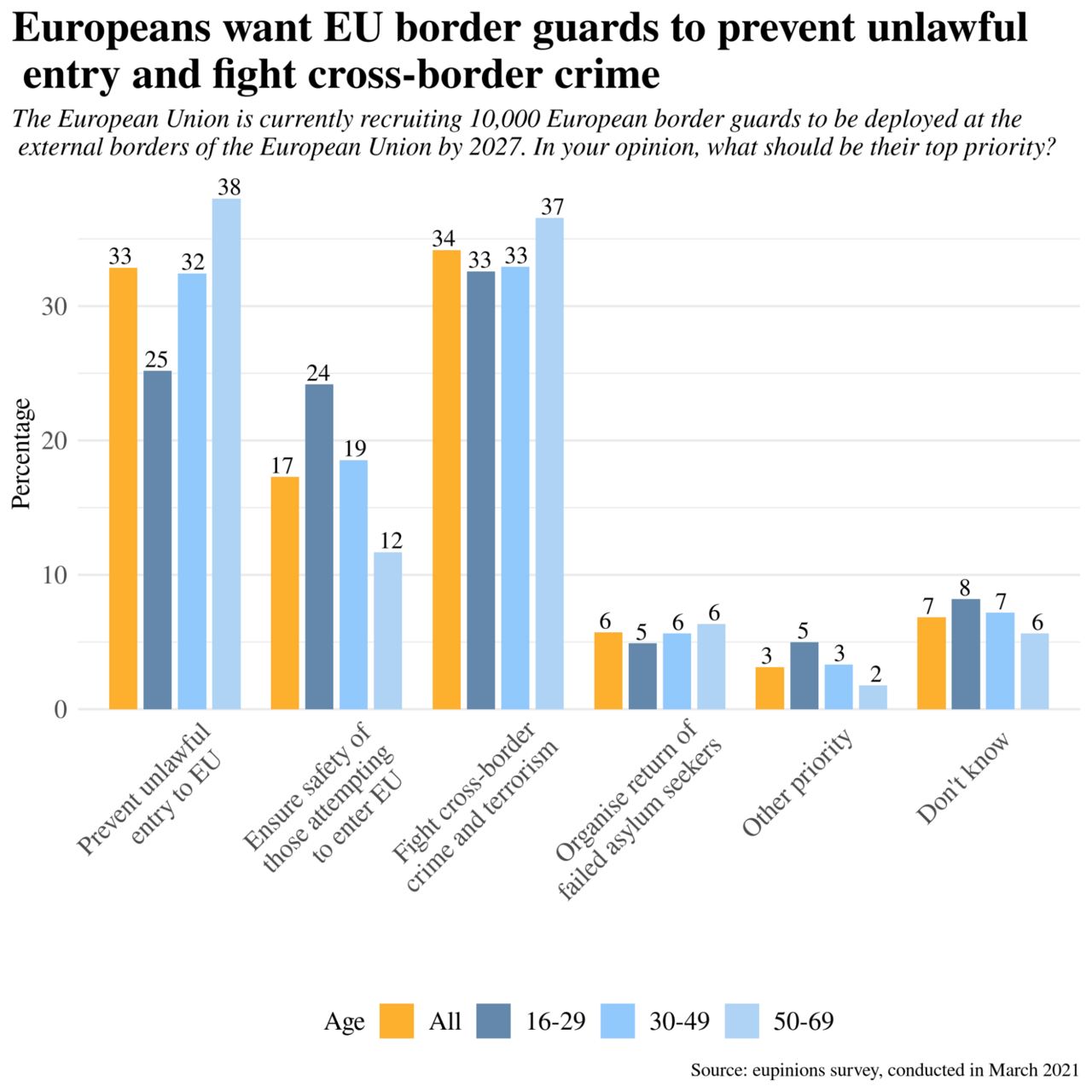
Figure 6
There were also some different priorities by gender, with men slightly more concerned with preventing unlawful entry to the EU than women, while women were more likely to say that the new border guards should prioritise fighting cross border crime and terrorism.
Respondents from different countries also expressed different priorities, with 45% of Germans believing the border guards should prioritise fighting cross-border crime and terrorism, compared to only 25% of Spanish respondents. Additionally, while 40% of both French and Polish respondents thought that the new guards should prioritise preventing illegal entry to the EU, only 19% of Germans thought this should be their top priority.
Europe today and tomorrow
Finally, we sought to assess the state of public opinion regarding some of the major issues that face Europe today, and that will likely face Europe in the near future.
European identity
We find that 71% of our respondents stated that they identified as European (figure 7). While young people were slightly more likely to identify as European, this was relatively consistent across age groups (74% for under-30s compared to 70% for older age groups). The divides in European identity instead come in terms of education, with those with higher levels of education being more likely to identify as European.
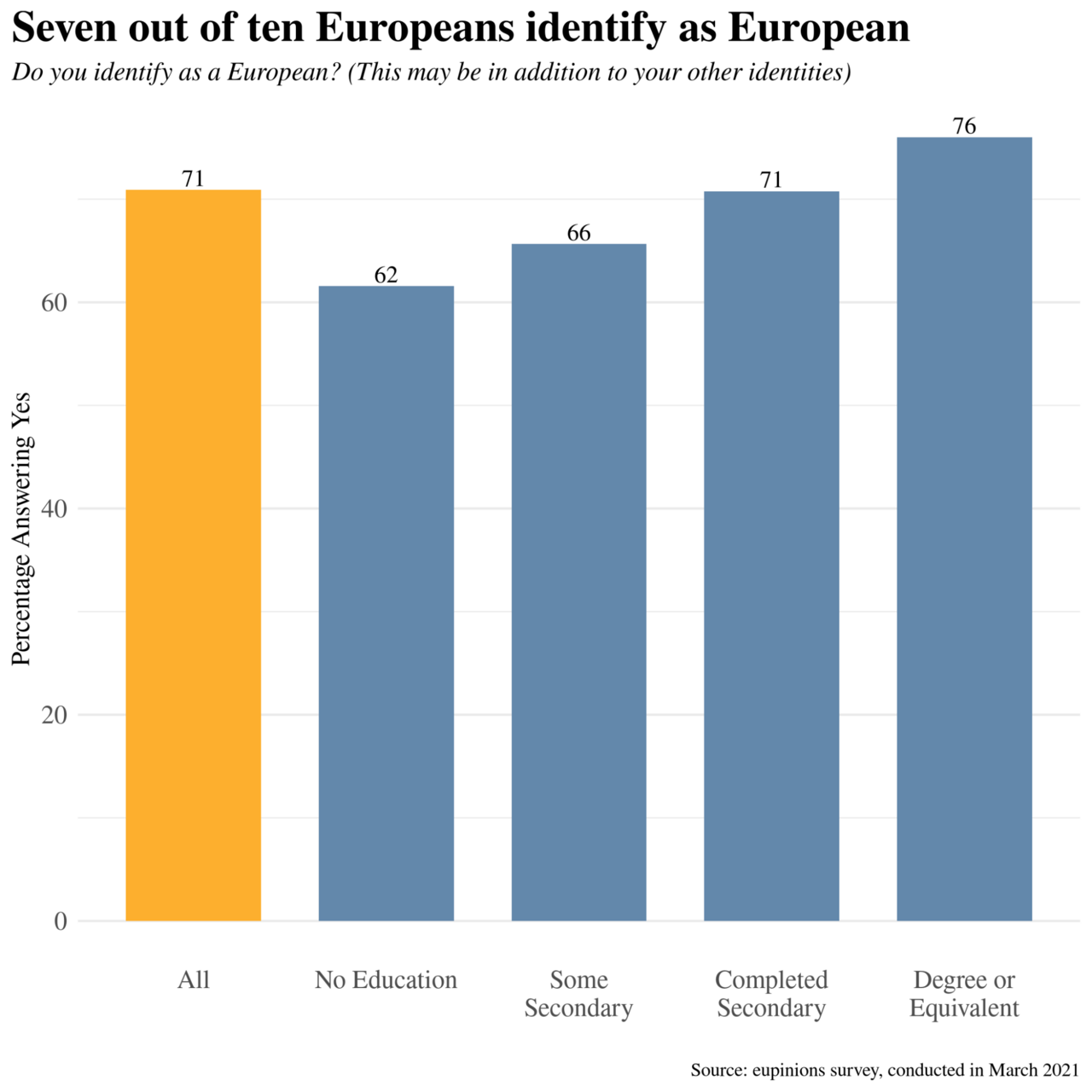
Figure 7
There were also big differences in European identification between countries, with 86% of Polish and 84% of Spanish respondents expressing a European identity, compared to only 60% of French and 63% of Italian respondents (figure 8).
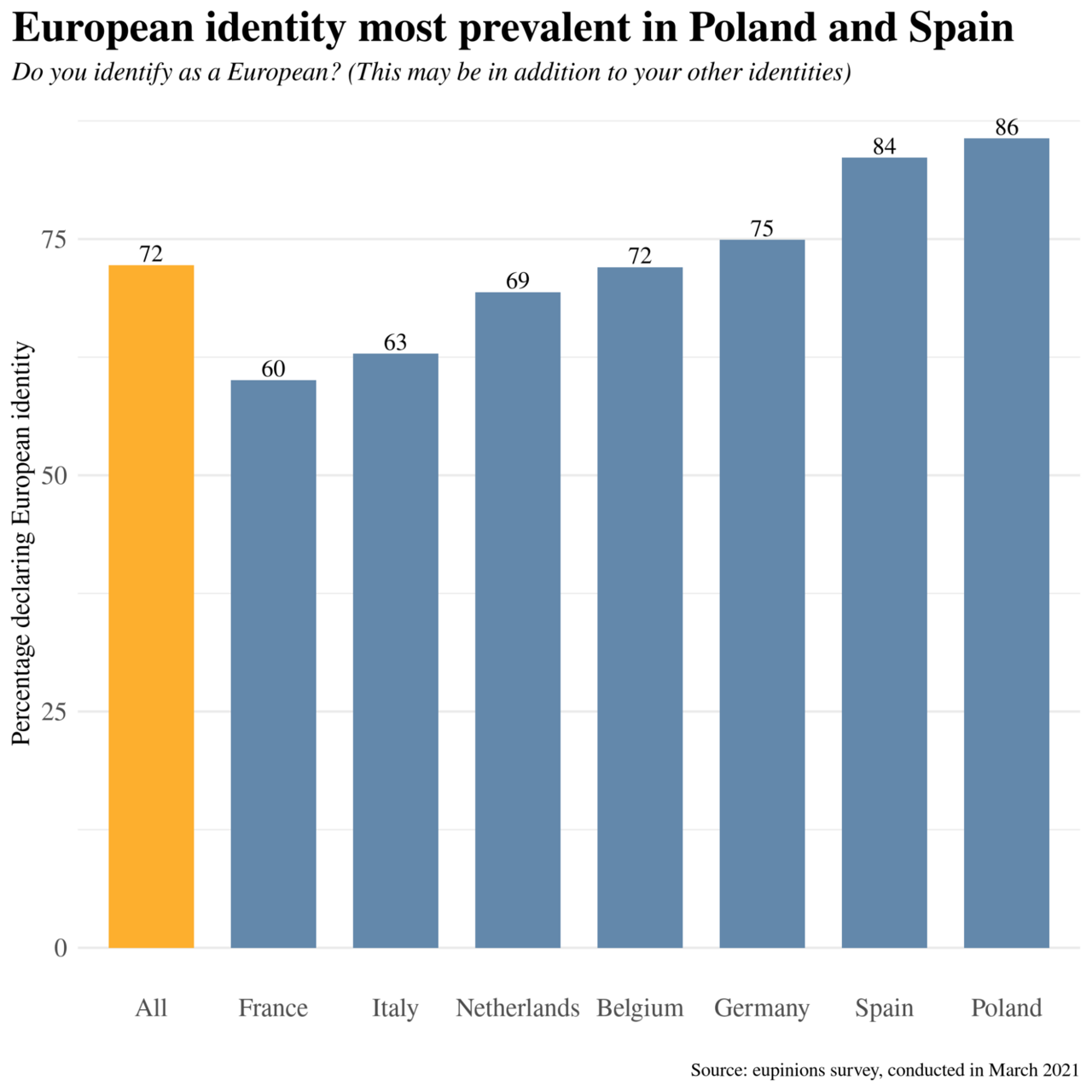
Figure 8
Vaccine procurement and distribution
Addressing perhaps the most topical issue in Europe today, we asked respondents about the European Commission's handling of the procurement and distribution of Covid-19 vaccines. The responses do not present a positive picture for the EU, with only 5% of respondents thinking the vaccine procurement and distribution has been handled very well, compared to 45% who think it has been handled either fairly badly (23%) or very badly (22%) (figure 9).
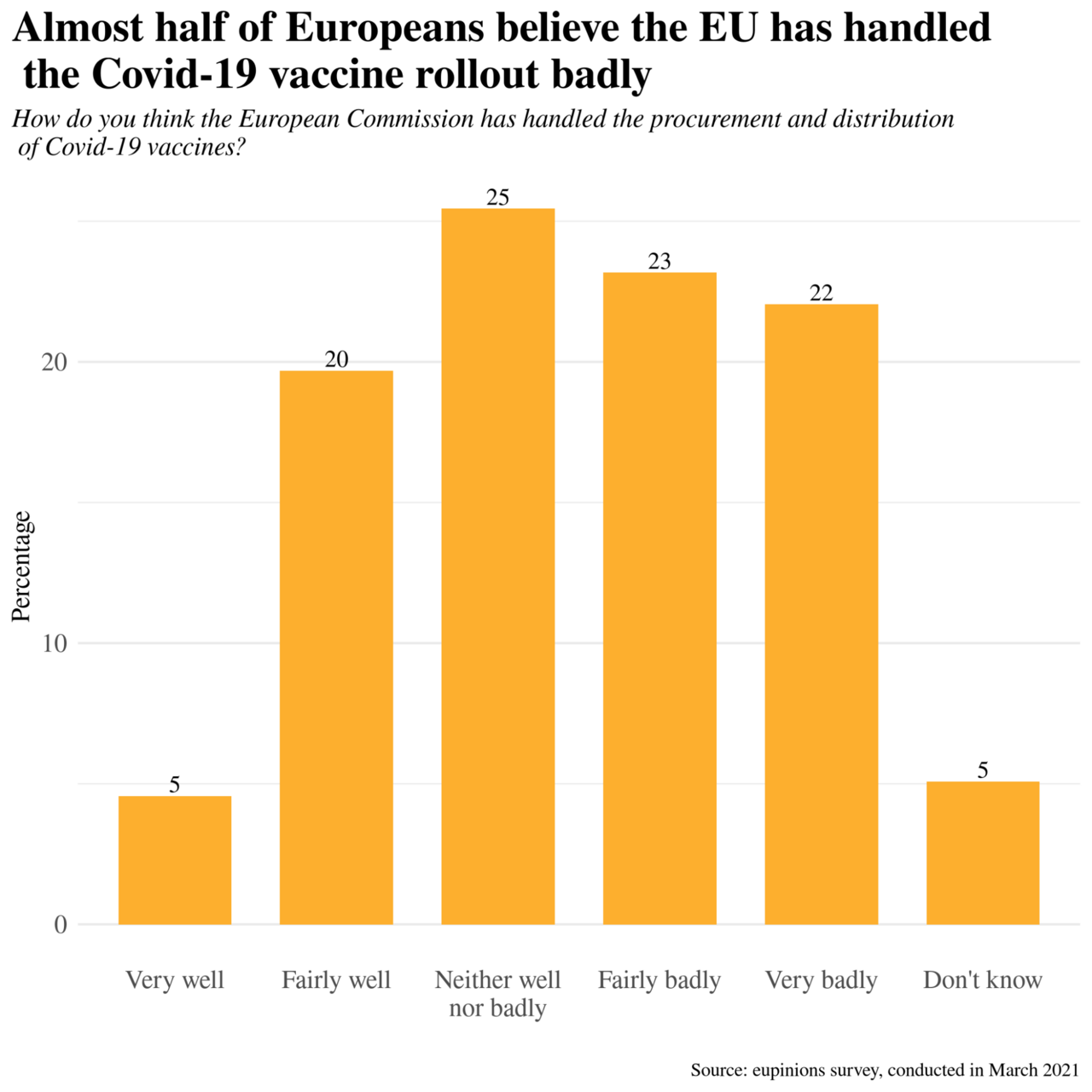
Figure 9
There was also an age divide in responses to this question, with younger respondents more positive than older respondents about the vaccine rollout (figure 10). A limitation of our data here is that our oldest group of respondents only includes those up to the age of 69, therefore missing many older Europeans who may have been eligible for a vaccine in Europe and may therefore feel differently about the effectiveness of the vaccine distribution.
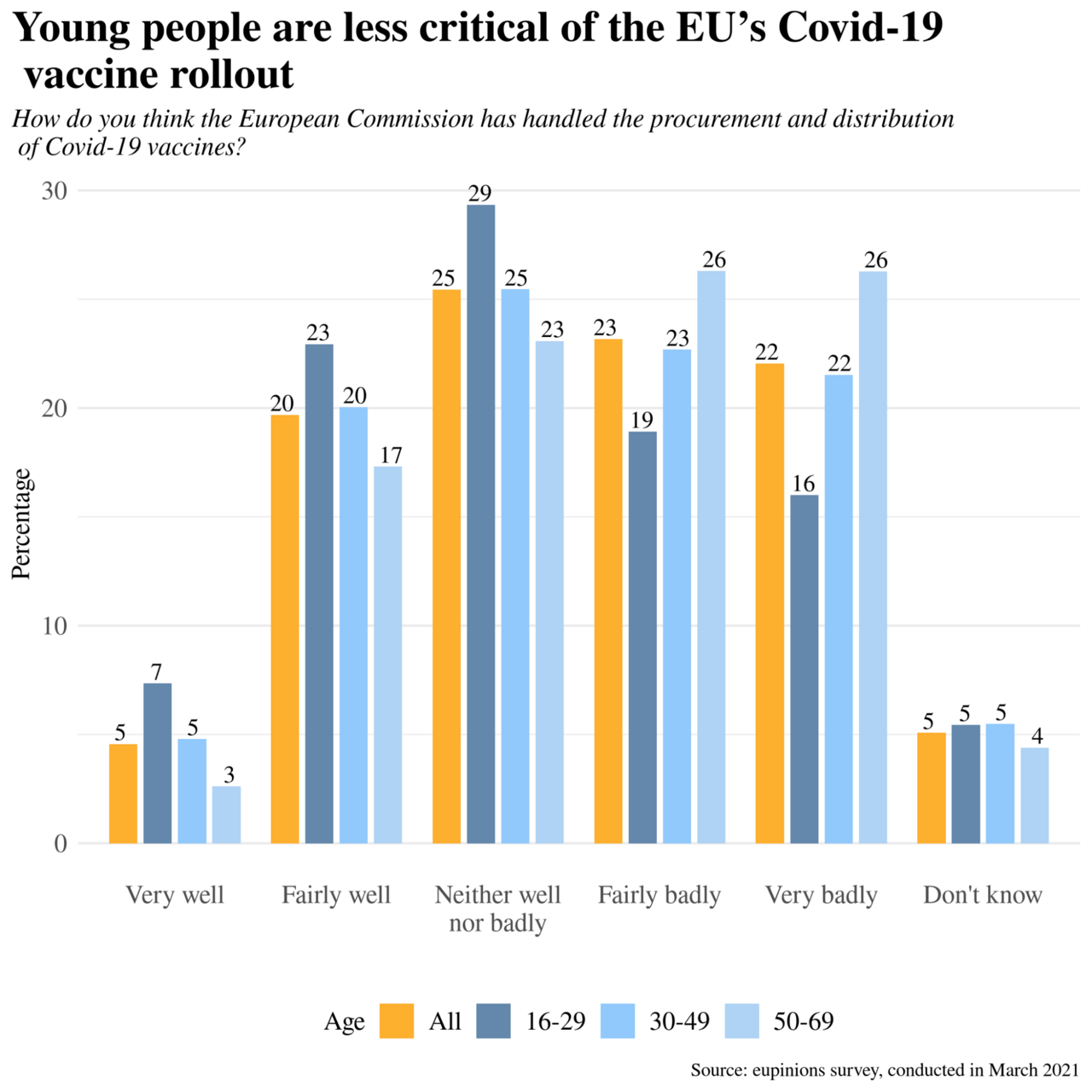
Figure 10
Graduates are also slightly more likely to think that the procurement and distribution of vaccines has been handled well (27%) compared to non-graduates (23%). Respondents from the Netherlands and Spain are particularly likely to think the vaccine rollout has gone well, while Germans are the most likely to respond that it has been handled very badly.
Upholding democratic rights
Given worrying domestic developments in EU member states such as Hungary, Poland and Slovenia, we also asked a question about the role of the EU in intervening to maintain democratic rights in member states. The question asked respondents how much they agreed or disagreed with the statement, "The EU should act more decisively to uphold liberal democratic institutions, such as independent courts and media, in all its member states". Overall 65% of respondents either strongly (29%) or somewhat agreed (36%) with this statement, while only 7% disagreed (figure 11).
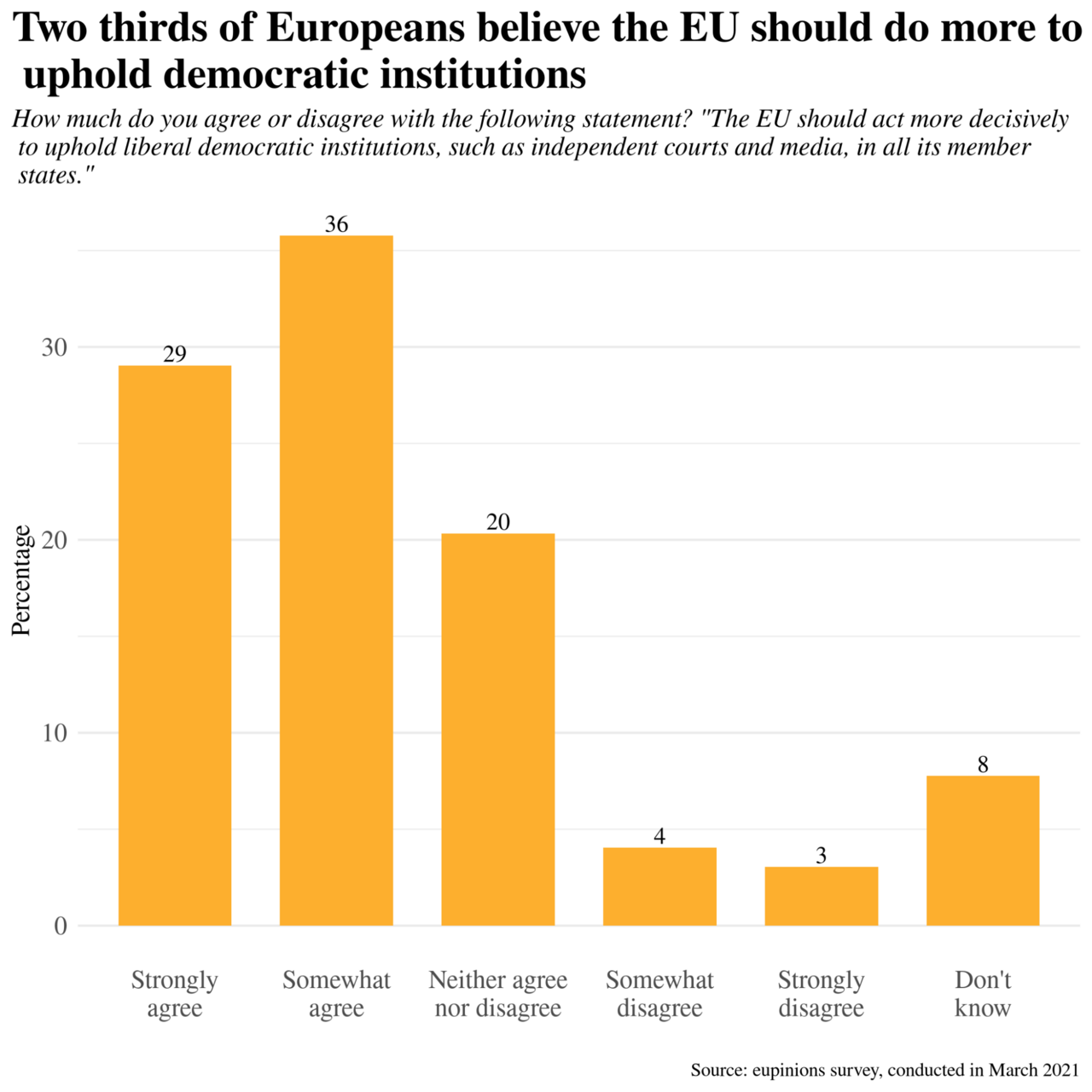
Figure 11
There were only small differences by age to this question, but larger disagreements by education. While 72% of graduates agreed that the EU should take more decisive action, only 62% of non-graduates supported this. Respondents from Germany (71%) and Spain (69%) were found to be the most likely to support more decisive action.
Europe in 2030?
We asked respondents how they would like the EU to look in 2030. The most frequently selected response was for there to be greater integration within the EU (28%), followed by the EU having the same balance of powers as it does today (21%) (figure 12). 13% of respondents said they would like there to be a single European government within the next decade, while 11% opted for a less integrated EU and another 11% for there to no longer be a European Union. There were sharp divides by age, with young people found to be much more in favour of greater integration.
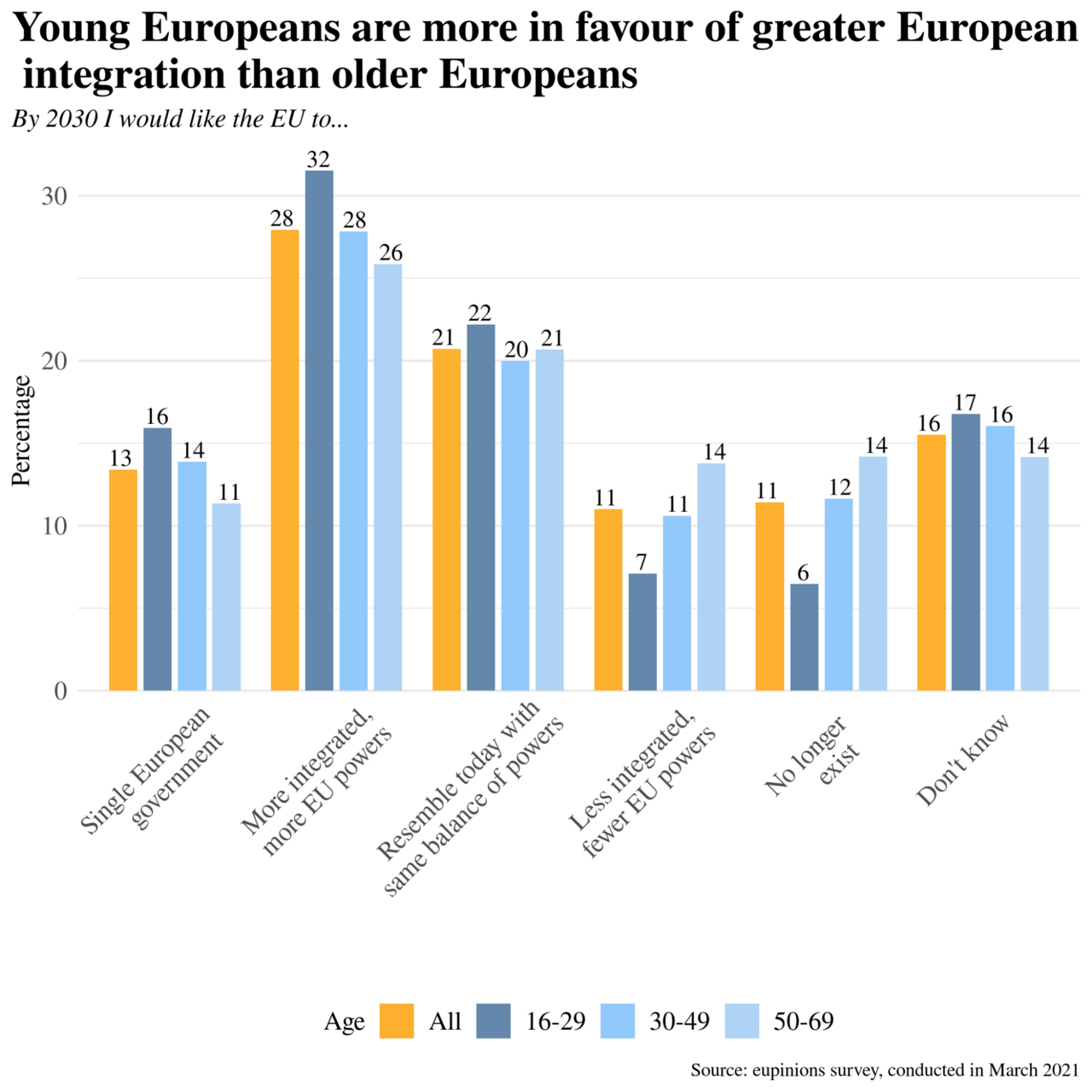
Figure 12
A single European government was most popular in Italy, selected by a fifth of our Italian respondents. By contrast, 15% of French respondents would like the EU to no longer exist - just one example of French dissatisfaction with several key aspects of the EU found in this report.
Tax the rich?
We asked respondents about the future of welfare in Europe, and in particular whether citizens in richer member states should contribute more to support citizens in poorer member states. We asked our sample how much they agreed or disagreed with the statement, "Taxpayers in richer EU member states should contribute more to the EU budget than they currently do to ensure a minimum standard of living in all member states". There was generally strong agreement with the proposition, with 53% either strongly (21%) or somewhat agreeing (31%). Only 19% disagreed (figure 13). This finding is remarkably stable across demographics, with little difference seen between age groups and different education levels.
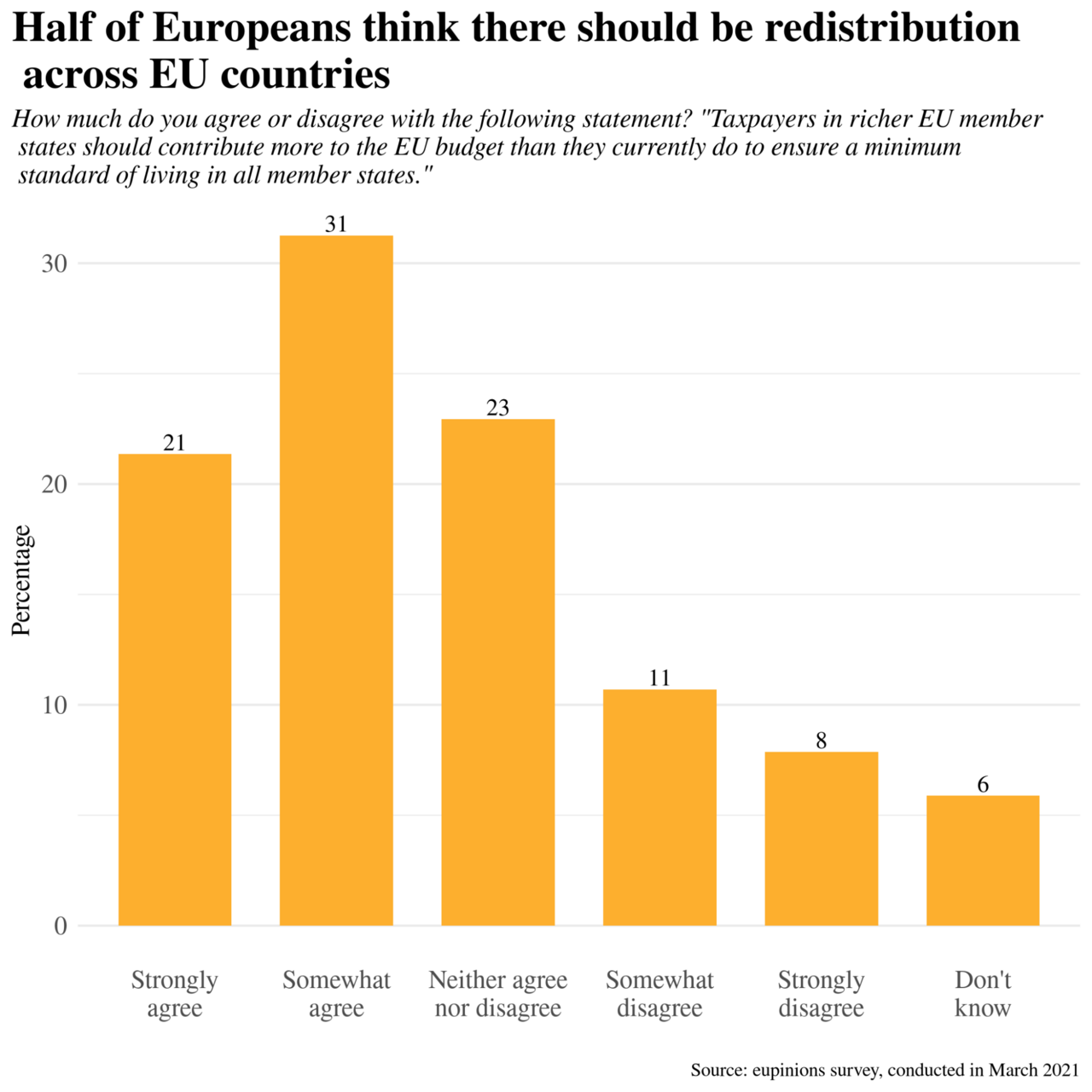
Figure 13
There are some differences between countries, with the strongest support for this proposal coming from Spain (66% agree, 10% disagree) and the least coming from Germany (40% agree, 32% disagree).
Threat of automation
Finally, we turned to the long-term threat to jobs of automation and asked respondents whether this meant the EU should be more involved in employment policy. Respondents were asked how much they agreed or disagreed with the statement, "Robots replacing some workers in Europe means that more decisions about employment and social protection should be taken at the EU level to protect jobs". Overall, 61% of respondents either strongly (29%) or somewhat (32%) agreed with this statement, suggesting there is an appetite for the EU to be more involved in employment policy (figure 14).
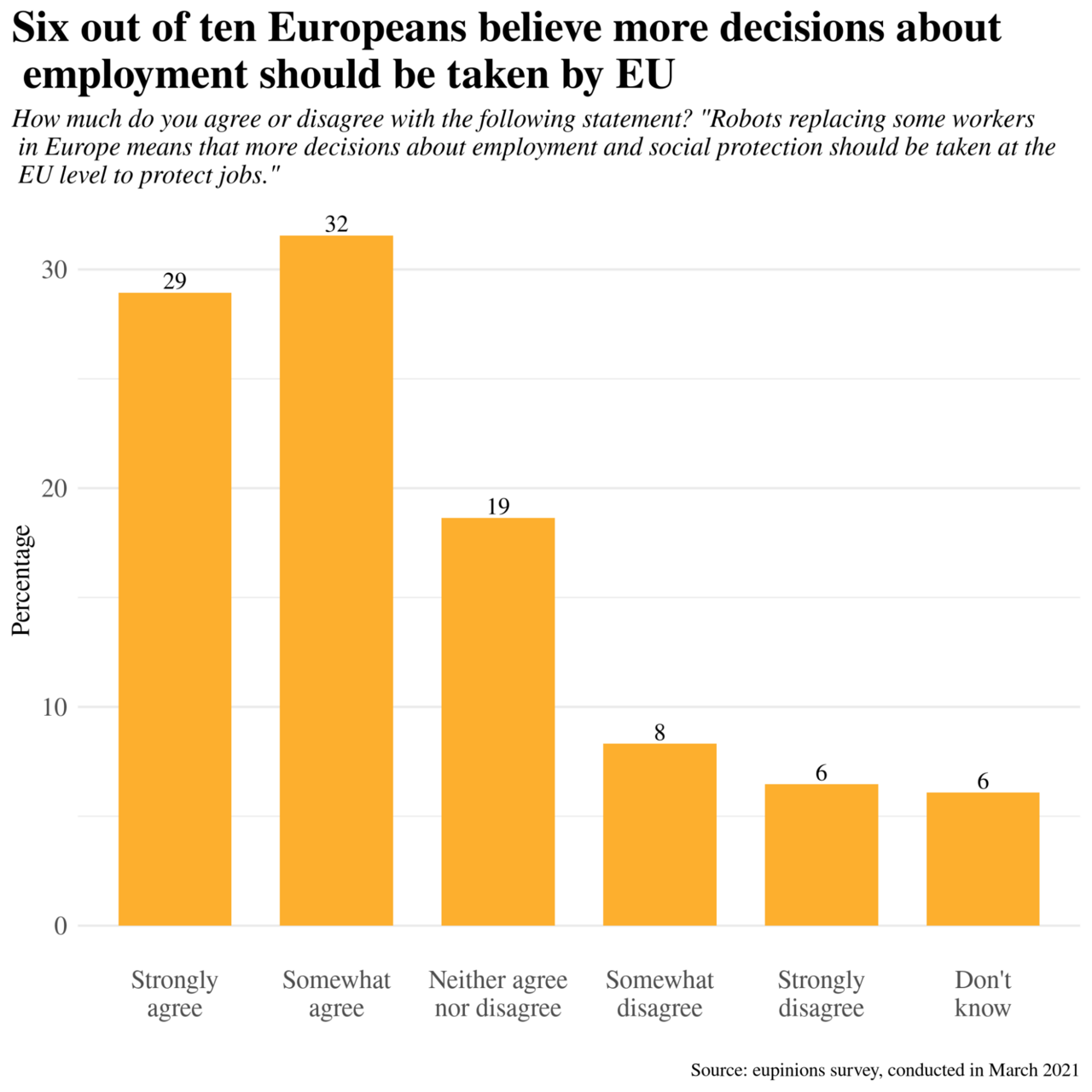
Figure 14
Interestingly, young people appear to be less concerned about the threat of automation, and are slightly less likely to agree with the statement than older age groups, despite their other attitudes being generally in favour of EU integration. Support for this proposal also varies amongst countries, with 47% of Spanish respondents strongly agreeing with the statement, compared to just 19% of Germans.
Methodology Note
The sample with a size of n=13,601 was drawn by Dalia Research from 11/03/2021 to 06/04/2021 across all 27 EU Member States plus the UK, taking into account current population distributions with regard to age (14-69 years), gender and region/country. In order to obtain census representative results, the data were weighted based upon the most recent Eurostat statistics. Any references to differences between countries in the report pertain only to the seven countries with sufficiently large sample sizes, namely: Belgium, Germany, France, Italy, The Netherlands, Poland and Spain. Calculated for a sample of this size and considering the design-effect, the margin of error would be +/-1.1 % at a confidence level of 95 %.
----------
The authors are members of the Europe's Stories project research team of the Dahrendorf Programme for the Study of Freedom at St Antony's College, Oxford University. This poll was part of a collaboration between that project and eupinions. Europe's Stories is funded by the Mercator foundation, the ZEIT foundation, and the Friedrich Naumann foundation.


